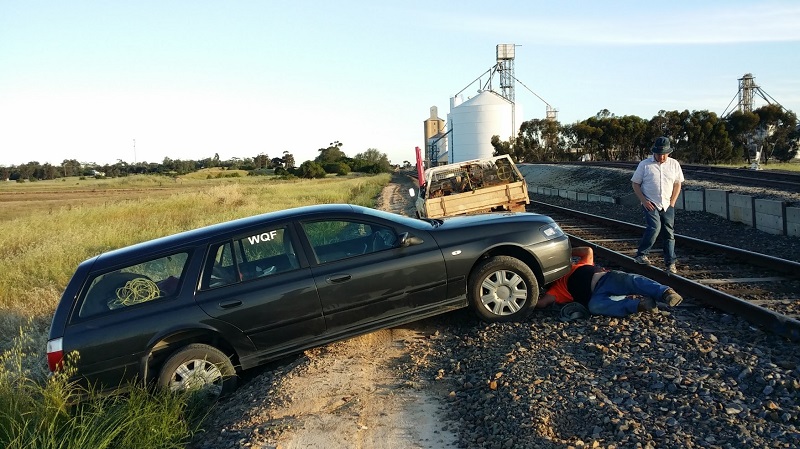Tomorrow being ANZAC day, I’d thought I’d post a few recording that I have made/edited. Note Reveille is played at the dawn service, Rouse at other times.
SemiArticulate
Random MusingsI’ve gone and done it. I’ve purchased a new microphone, so I can do some voice over work for my paid employment (so most of which won’t see the light of the internet).
It is a Rode NT-USB mini.

It sounds so much better than the laptop microphone (or the cheap headset microphone for that matter). And sorry to Capt Nick for NickRolling you!
And yes, I usually put some fluffy towels on the monitors and desk to reduce reflections.
I am announcing my decision to start my Commercial Pilots licence. I made the decision pre-COVID19, and didn’t want to announce anything until I had a better understanding of how COVID19 would impact on the training.
I do this to add a little self-accountability. I’ll give micro updates as I progress through the training.
Current situation:
Licence/Endorsements:
Powered: RPL-Aeroplane, RPL-Flight Radio, L6 English Language Proficiency, Tail Wheel Undercarriage, Glider Towing, Class 2 Medical. Total hours: 128.7 (including 76.8 PIC, 2.8 Dual Instrument)
Glider Pilot Certificate- L1 Instructor, Independent Operator, Self Launching Sailplane. Total hours: 236.9 (including 163.5 PIC). I include gliding time, as sailplanes are considered aeroplanes under CASR Part 61.025.
What elements need to be completed:
- RPL-Controlled Airspace
- RPL-Controlled Aerodrome
- RPL-Nav
- CPL-Nav Theory
- CPL-Met Theory
- CPL-Air Law Theory
- CPL-Aeronautical Knowledge theory
- CPL-Gen Knowledge theory
- CPL-Performance Theory
- CPL-Human Factors theory
- Flight Test
- 7.2h Dual Instrument (total 10hrs)
- 20h Solo nav (including one of 300nm+two stops)
Note some of the above requirements can be combined. For example the RPL-NAV requires minimum of 5hrs solo Nav with a 150nm flight with two stops.
So as you can see, I’ve got a bit to go. I do meet the 200 hour total time for the non-integrated training (including 100 hour PIC). By the time I’ve done the 20 hour solo navigation flights, I’ll have over 100 hours PIC in powered as well.
[ed: this article first appeared in the January 1946 issue of American Affairs]
The superior position of public government over private business is nowhere more clearly evident than in government’s power to tax business. Business gets its many rule-making powers from public government. Public government sets the limits to the exercise of these rule-making powers of business, and protects the freedom of business operations within this area of authority. Taxation is one of the limitations placed by government on the power of business to do what it pleases.
There is nothing reprehensible about this procedure. The business that is taxed is not a creature of flesh and blood, it is not a citizen. It has no voice in how it shall be governed —- nor should it. The issues in the taxation of business are not moral issues, but are questions of practical effect: What will get the best results? How should business be taxed so that business will make its greatest contribution to the common good?
It is sometimes instructive when faced with alternatives to ask the underlying question. If we are to understand the problems involved in the taxation of business, we must first ask: “Why does the government need to tax at all?” This seems to be a simple question, but, as is the case with simple questions, the obvious answer is likely to be a superficial one. The obvious answer is, of course, that taxes provide the revenue which the government needs in order to pay its bills.
It Happened
If we look at the financial history of recent years it is apparent that nations have been able to pay their bills even though their tax revenues fell short of expenses. These countries whose expenses were greater than their receipts from taxes paid their bills by borrowing the necessary money. The borrowing of money, therefore, is an alternative which governments use to supplement the revenues from taxation in order to obtain the necessary means for the payment of their bills.
A government which depends on loans and on the refunding of its loans to get the money it requires for its operations is necessarily dependent on the sources from which the money can be obtained. In the past, if a government persisted in borrowing heavily to cover its expenditures, interest rates would get higher and higher, and greater and greater inducements would have to be offered by the government to the lenders. These governments finally found that the only way they could maintain both their sovereign independence and their solvency was to tax heavily enough to meet a substantial part of their financial needs, and to be prepared —-if placed under undue pressure —- to tax to meet them all.
The necessity for a government to tax in order to maintain both its independence and its solvency is true for state and local governments, but it is not true for a national government. Two changes of the greatest consequence have occurred in the last twenty-five years which have substantially altered the position of the national state with respect to the financing of its current requirements.
- The first of these changes is the gaining of vast new experience in the management of central banks.
- The second change is the elimination, for domestic purposes, of the convertibility of the currency into gold.
Free of the Money Market
Final freedom from the domestic money market exists for every sovereign national state where there exists an institution which functions in the manner of a modern central bank, and whose currency is not convertible into gold or into some other commodity.
The United States is a national state which has a central banking system, the Federal Reserve System, and whose currency, for domestic purposes, is not convertible into any commodity. It follows that our Federal Government has final freedom from the money market in meeting its financial requirements. Accordingly, the inevitable social and economic consequences of any and all taxes have now become the prime consideration in the imposition of taxes. In general, it may be said that since all taxes have consequences of a social and economic character, the government should look to these consequences in formulating its tax policy. All federal taxes must meet the test of public policy and practical effect. The public purpose which is served should never be obscured in a tax program under the mask of raising revenue.
What Taxes Are Really For
Federal taxes can be made to serve four principal purposes of a social and economic character. These purposes are:
- As an instrument of fiscal policy to help stabilize the purchasing power of the dollar;
- To express public policy in the distribution of wealth and of income, as in the case of the progressive income and estate taxes;
- To express public policy in subsidizing or in penalizing various industries and economic groups;
- To isolate and assess directly the costs of certain national benefits, such as highways and social security.
In the recent past, we have used our federal tax program consciously for each of these purposes. In serving these purposes, the tax program is a means to an end. The purposes themselves are matters of basic national policy which should be established, in the first instance, independently of any national tax program.
Among the policy questions with which we have to deal are these:
- Do we want a dollar with reasonably stable purchasing power over the years?
- Do we want greater equality of wealth and of income than would result from economic forces working alone?
- Do we want to subsidize certain industries and certain economic groups?
- Do we want the beneficiaries of certain federal activities to be aware of what they cost?
These questions are not tax questions; they are questions as to the kind of country we want and the kind of life we want to lead. The tax program should be a means to an agreed end. The tax program should be devised as an instrument, and it should be judged by how well it serves its purpose.
By all odds, the most important single purpose to be served by the imposition of federal taxes is the maintenance of a dollar which has stable purchasing power over the years. Sometimes this purpose is stated as “the avoidance of inflation”; and without the use of federal taxation all other means of stabilization, such as monetary policy and price controls and subsidies, are unavailing. All other means, in any case, must be integrated with federal tax policy if we are to have tomorrow a dollar which has a value near to what it has today.
The war has taught the government, and the government has taught the people, that federal taxation has much to do with inflation and deflation, with the prices which have to be paid for the things that are bought and sold. If federal taxes are insufficient or of the wrong kind, the purchasing power in the hands of the public is likely to be greater than the output of goods and services with which this purchasing demand can be satisfied. If the demand becomes too great, the result will be a rise in prices, and there will be no proportionate increase in the quantity of things for sale. This will mean that the dollar is worth less than it was before —- that is inflation. On the other hand, if federal taxes are too heavy or are of the wrong kind, effective purchasing power in the hands of the public will be insufficient to take from the producers of goods and services all the things these producers would like to make. This will mean widespread unemployment.
The dollars the government spends become purchasing power in the hands of the people who have received them. The dollars the government takes by taxes cannot be spent by the people, and, therefore, these dollars can no longer be used to acquire the things which are available for sale. Taxation is, therefore, an instrument of the first importance in the administration of any fiscal and monetary policy.
To Distribute the Wealth
The second principal purpose of federal taxes is to attain more equality of wealth and of income than would result from economic forces working alone. The taxes which are effective for this purpose are the progressive individual income tax, the progressive estate tax, and the gift tax. What these taxes should be depends on public policy with respect to the distribution of wealth and of income. It is important, here, to note that the estate and gift taxes have little or no significance, as tax measures, for stabilizing the value of the dollar. Their purpose is the social purpose of preventing what otherwise would be high concentration of wealth and income at a few points, as a result of investment and reinvestment of income not expended in meeting day-to-day consumption requirements. These taxes should be defended and attacked it terms of their effects on the character of American life, not as revenue measures.
The third reason for federal taxes is to provide a subsidy for some industrial or economic interest. The most conspicuous example of these taxes is the tariffs on imports. Originally, taxes of this type were imposed to serve a double purpose since, a century and a half ago, the national government required revenues in order to pay its bills. Today, tariffs on imports are no longer needed for revenue. These taxes are nothing more than devices to provide subsidies to selected industries; their social purpose is to provide a price floor above which a domestic industry can compete with goods which can be produced abroad and sold in this country more cheaply except for the tariff protection. The subsidy is paid, not at the port of entry where the imported goods are taxed, but in the higher price level for all goods of the same type produced and sold at home.
The fourth purpose served by federal taxes is to assess, directly and visibly, the costs of certain benefits. Such taxation is highly desirable in order to limit the benefits to amounts which the people who benefit are willing to pay. The most conspicuous examples of such measures are the social security benefits, old-age and unemployment insurance. The social purposes of giving such benefits and of assessing specific taxes to meet the costs are obvious. Unfortunately and unnecessarily, in both cases, the programs have involved staggering deflationary consequences as a result of the excess of current receipts over current disbursements.
The Bad Tax
The federal tax on corporate profits is the tax which is most important in its effect on business operations. There are other taxes which are of great concern to special classes of business. There are many problems of state and local taxation of business which become extremely urgent, particularly when a corporation has no profits at all. However, we shall confine our discussion to the federal corporation income tax, since it is in this way that business is principally taxed. We shall also confine our considerations to the problems of ordinary peacetime taxation since, during wartime, many tax measures, such as the excess-profits tax, have a special justification.
- Taxes on corporation profits have three principal consequences —- all of them bad. Briefly, the three bad effects of the corporation income tax are:
- The money which is taken from the corporation in taxes must come in one of three ways. It must come from the people, in the higher prices they pay for the things they buy; from the corporation’s own employees in wages that are lower than they otherwise would be; or from the corporation’s stockholders, in lower rate of return on their investment. No matter from which sources it comes, or in what proportion, this tax is harmful to production, to purchasing power, and to investment.
- The tax on corporation profits is a distorting factor in managerial judgment, a factor which is prejudicial to clear engineering and economic analysis of what will be best for the production and distribution of things for use. And, the larger the tax, the greater the distortion.
- The corporation income tax is the cause of double taxation. The individual taxpayer is taxed once when his profit is earned by the corporation, and once again when he receives the profit as a dividend. This double taxation makes it more difficult to get people to invest their savings in business than if the profits of business were only taxed once. Furthermore, stockholders with small incomes bear as heavy a burden under the corporation income tax as do stockholders with large incomes.
Analysis
Let us examine these three bad effects of the tax on corporation profits more closely. The first effect we observed was that the corporation income tax results in either higher prices, lower wages, reduced return on investment, or all three in combination. When the corporation income tax was first imposed it may have been believed by some that an impersonal levy could be placed on the profits of a soulless corporation, a levy which would be neither a sales tax, a tax on wages, or a double tax on the stockholder. Obviously, this is impossible in any real sense. A corporation is nothing but a method of doing business which is embodied in words inscribed on a piece of paper. The tax must be paid by one or more of the people who are parties at interest in the business, either as customer, as employee, or as stockholder.
It is impossible to know exactly who pays how much of the tax on corporation profits. The stockholder pays some of it, to the extent that the return on his investment is less than it would be if there were no tax. But, it is equally certain that the stockholder does not pay all of the tax on corporate income —- indeed, he may pay very little of it. After a period of time, the corporation income tax is figured as one of the costs of production and it gets passed on in higher prices charged for the company’s goods and services, and in lower wages, including conditions of work which are inferior to what they otherwise might be.
The reasons why the corporation income tax is passed on, in some measure, must be clearly understood. In the operations of a company, the management of the business, directed by the profit motive, keeps its eyes on what is left over as profit for the stockholders. Since the corporation must pay its federal income taxes before it can pay dividends, the taxes are thought of —- the same as any other uncontrollable expense —- as an outlay to be covered by higher prices or lower costs, of which the principal cost is wages. Since all competition in the same line of business is thinking the same way, prices and costs will tend to stabilize at a point which will produce a profit, after taxes, sufficient to give the industry access to new capital at a reasonable price. When this finally happens, as it must if the industry is to hold its own, the federal income tax on corporations will have been largely absorbed in higher prices and in lower wages. The effect of the corporation income tax is, therefore, to raise prices blindly and to lower wages by an undeterminable amount. Both tendencies are in the wrong direction and are harmful to the public welfare.
Where Would the Money Go?
Suppose the corporation income tax were removed, where would the money go that is now paid in taxes? That depends. If the industry is highly competitive, as is the case with retailing, a large share would go in lower prices, and a smaller share would go in higher wages and in higher yield on savings invested in the industry. If labor in the industry is strongly organized, as in the railroad, steel, and automotive industries, the share going in higher wages would tend to increase. If the industry is neither competitive nor organized nor regulated —- of which industries there are very few —- a large share would go to the stockholders. In so far as the elimination of the present corporation income tax would result in lower prices, it would raise the standard of living for everyone.
The second bad effect of the corporation income tax is that it is a distorting factor in management judgment, entering into every decision, and causing actions to be taken which would not have been taken on business grounds alone. The tax consequences of every important commitment have to be appraised. Sometimes, some action which ought to be taken cannot be taken because the tax results make the transaction valueless, or worse. Sometimes, apparently senseless actions are fully warranted because of tax benefits. The results of this tax thinking is to destroy the integrity of business judgment, and to set up a business structure and tradition which does not hang together in terms of the compulsion of inner economic or engineering efficiency.
Premium on Debt
The most conspicuous illustration of the bad effect of tax consideration on business judgment is seen in the preferred position that debt financing has over equity financing. This preferred position is due to the fact that interest and rents, paid on capital used in business, are deductible as expense; whereas dividends paid are not. The result weighs the scales always in favor of debt financing, since no income tax is paid on the deductible costs of this form of capital. This tendency goes on, although it is universally agreed that business and the country generally would be in a stronger position if a much larger proportion of all investment were in common stocks and equities, and a smaller proportion in mortgages and bonds.
It must be conceded that, in many cases, a high corporation income tax induces management to make expenditures which prudent judgment would avoid. This is particularly true if a long-term benefit may result, a benefit which cannot or need not be capitalized. The long-term expense is shared involuntarily by government with business, and, under these circumstances, a long chance is often well worth taking. Scientific research and institutional advertising are favorite vehicles for the use of these cheap dollars. Since these expenses reduce profits, they reduce taxes at the same time; and the cost to the business is only the margin of the expenditure that would have remained after the taxes had been paid —- the government pays the rest. Admitting that a certain amount of venturesome expenditure does result from this tax inducement, it is an unhealthy form of unregulated subsidy which, in the end, will soften the fibre of management and will result in excess timidity when the risk must be carried by the business alone.
The third unfortunate consequence of the corporation income tax is that the same earnings are taxed twice, once when they are earned and once when they are distributed. This double taxation causes the original profit margin to carry a tremendous burden of tax, making it difficult to justify equity investment in a new and growing business. It also works contrary to the principles of the progressive income tax, since the small stockholder, with a small income, pays the same rate of corporation tax on his share of the earnings as does the stockholder whose total income falls in the highest brackets. This defect of double taxation is serious, both as it affects equity in the total tax structure, and as a handicap to the investment of savings in business.
Shortly, an Evil
Any one of these three bad effects of the corporation income tax would be enough to put it severely on the defensive. The three effects, taken together, make an overwhelming case against this tax. The corporation income tax is an evil tax and it should be abolished.
The corporation income tax cannot be abolished until some method is found to keep the corporate form from being used as a refuge from the individual income tax and as a means of accumulating unneeded, uninvested surpluses. Some way must be devised whereby the corporation earnings, which inure to the individual stockholders, are adequately taxed as income of these individuals.
The weaknesses and dangers of the corporation income tax have been known for years, and an ill-fated attempt to abolish it was made in 1936 in a proposed undistributed profits tax. This tax, as it was imposed by Congress, had four weaknesses which soon drove it from the books. First, the income tax on corporations was not eliminated in the final legislation, but the undistributed profits tax was added on top of it. Second, it was never made absolutely clear, by regulation or by statute, just what form of distributed capitalization of withheld and reinvested earnings would be taxable to the stockholders and not to the corporation. Third, the Securities and Exchange Commission did not set forth special and simple regulations covering securities issued to capitalize withheld earnings. Fourth, the earnings of a corporation were frozen to a particular fiscal year, with none of the flexibility of the carry-forward, carry-back provisions of the present law.
Granted that the corporation income tax must go, it will not be easy to devise protective measures which will be entirely satisfactory. The difficulties are not merely difficulties of technique and of avoiding the pitfalls of a perfect solution impossible to administer, but are questions of principle that raise issues as to the proper locus of power over new capital investment.
Can the government afford to give up the corporation income tax? This really is not the question. The question is this: Is it a favorable way of assessing taxes on the people —- on the consumer, the workers and investors —- who after all are the only real taxpayers? It is clear from any point of view that the effects of the corporation income tax are bad effects. The public purposes to be served by taxation are not thereby well served. The tax is uncertain in its effect with respect to the stabilization of the dollar, and it is inequitable as part of a progressive levy on individual income. It tends to raise the prices of goods and services. It tends to keep wages lower than they otherwise might be. It reduces the yield on investment and obstructs the flow of savings into business enterprise.
It was the first day of Bendigo Gliding Club’s Melbourne Cup Weekend. I had arrived the night before, late enough to setup camp and find dinner. I had managed to duck into Bendigo to pick up a few items that I had forgot to pack, back just in time for briefing. Jarek had used the time wisely, by rigging his PIK20 WQF.
Briefing told us it was going to be reasonable conditions blue day with 4kt climbs to around 4-5000ft. Tasking was a 217km Assigned Area Task. Not too big as the weather was due to soften the climbs around 1700ish.
I ended up rigging Geelong’s LS4 UKA after briefing, with a little help from Jarek and Mike Durrant.
After most people started gridded at around 1300, Jarek launched first, at 1318, and headed off into the wild blue yonder.
Once I had finished getting ready, I gridded and launched at 1348, behinds Bendigo’s Eurofox. Climb rates were around the same as the Supercub, and I released at 1800ft AGL in what I thought was decent lift. Unfortuneatly I couldn’t stay in it, due to the thermal being narrow and broken, and my reduced currency in a glider. I had struggled to gain around 200 ft, so I decided to see if I could find something better. I did not. I did, however, find 6kts of sink. I ended up joining downwind at 1000ft AGL, and managed to turn into base at 1200ft, my best climb of the day. Bah!
Jarek had much better luck. After going east to Elmore, he pushed north to Echuca. After Echuca, Jarek went west to the Mitiamo Forrest, a reliable source of climbs.
Feeling enboldened, he decided to push up to Pyramid Hill. Unfortunealy, because the day was ended he didn’t see another good climb, and outlanded just west of the Mitiamo Forrest, on the way back from Pyramid Hill.
At around 1600, Jarek calls the club phone and asks for a retrieve. I dutifully hook up WQF’s trailer to Jarek’s car and I head north. As it was about 40k as the glider flies, it did take some time. Jarek rang to assist with directions. He could see the rail track with a good dirt road on the same side (east) , and he could see the Mitiamo silos, and advised that I should turn off at the silos and follow the track up.
I had plugged in his coordinates into google maps, which was telling me to go to the east, though the Mitiamo Forrest. Knowing google maps has been known to lead retrieve crews on wild goose chases, I thought it was more prudent to follow the advice of a much more experienced glider pilot.
This turned out to be unwise. The track Jarek led me down only went for about 500 meters before becoming a swamp.
Jarek had decided to walk down from his outland paddock, an estimated 15 minutes. As it was about 4k, at turned out to be about 45 minutes. During Jarek’s time on the tracks, he heard a “toot toot” of a train, with two engines at either end with some empty flat beds in between. This forced him onto the service track. I waved to the drivers as they passed my location.
Normally in such geographical embarrassments, one would just turn around and backtrack. This proved rather difficult, as the track was only just wider than Jarek’s car. Reversing up the narrow track proved beyond my skills. So we disconnected the trailer and swung it around (WQFs trailer is reasonably light without the glider). Jarek then volunteered to turn the car around.
The narrowness of the tracked necessitated a 1000pt turn.

Dramatisation of Jarek’s 1000pt turn
At a point in this display, Jarek went a little too far, and managed to get the rear wheels a little over the embankment.
Whilst we were trying figure out a way of extracting Jarek’s car, we heard a now familiar “toot toot”. The train had decided it didn’t want to go south, and North was a much better option this time of year. As the car had its nose over the track, Jarek had to reverse a bit more down the embankment. We now had a beached car. No amount of rocking back and forth was going to get us out of this mess.
Jarek and I then headed into town, and found a local who had a ute to drag us out. He did tell us that it was the first time in months that a train had come by this way.
To get to the falcon, he had tow the trailer out of the way. Then he used a lifting strap to tow the Falcon out of the ditch.

We thanked the kind local, and headed on our way. Coincidently the was Google had originally advised.
We had a look at the northern approaches to this paddock, but it required traveling down beside the railway track. Deciding we had pushed our luck enough for one day, we went around to the south side of the paddock. We found a gate, unfortunately padlocked. We tried lifting it off the hinges, but it was too rusted on.
We found a wider service road (the one Jarek had found earlier, but was only one paddock long), a part of the fence was down, allowing access. It was a good, if remote, paddock to have a outlanding in.

Once we arrived at the glider, we were joined by about 10,000,000 assistants. They didn’t assist much, being mosquitoes, just lots of biting.
Between being bitten , and the failing light, it would have been one of the quickest de-rig I’ve seen. We then drove back to camp, taking a route away from the tracks, for a return at 2115hrs, to some roast dinner, and a quenching ale.
Stats for the day:
- Mike did 256km at 72km/h
- Jarek did 150km at 53km/h
- I did 10k at 65km/h
- 40k retrieve in 5 hours
As I type this, it looks like Greece will default on the IMF payment of €1.6b. It looks like the Greek people view this as the lesser of the evils facing the country. Austerity has produced a depression-level contraction of the economy, 25% smaller than the peak, 25-30% unemployment (60% youth unemployment). All the IMF and the ECB (not to mention lender economies such as Germany) could offer is years of “more of the same”.
The Greek government was elected earlier this year on an anti-austerity platform. Anyone half paying attention could see that the democratic mandate was going to have issues with the unelected troika.
One thing I will have to point out, is that “Greek bailout” is seriously incorrect. If Greece defaults, Greece will still exist. It is not like when a company defaults. Countries cannot be dissolved. There will be consequences, some bad and quite painful, but Greece will still exist. So when they talk of bailouts, they are actually talking about bailing out Greece’s creditors (by and large private banks in France and Germany – although a lot of that debt was transferred to the public debt of the IMF and the ECB).
Whatever happens over the next few weeks, it will be rough for the Greeks. Exit from the Euro currency and returning to a devalued Drachma may be the best long term strategy (due to increased competitiveness of Greek exports), but it won’t be pretty for either Greece or the other exporting nations in the Eurozone.
The QandA controversy: was Mallah’s appearance a freedom of speech issue? Or, as the government and the Murdock press hyperventilators would suggest an attack on the good Abbit Government?
Tim “freedom boy” Wilson would suggest that it is not a freedom of speech issue. He also suggests that the ABC should not have given Mallah a platform to express himself. How is denying a platform for expression of ideas not a freedom of speech is beyond my comprehension.
Paul Kelly only sounded like a broken record saying (paraphrasing) Bad ABC, Bad ABC. Sounding only slightly less coherent than Granpa Simpson’s more lucid moments.
Mallah is the first to admit that he has done some stupid things in the past, including threatening ASIO officers (yes, those same freedom-loving busybodies). He has participated in activities that would get you arrested nowadays. He has even threatened two NewsCorp female “journalists” with gang rape (only just recently). By all accounts, Mallah is not a pleasant fellow.
There is one Thorne in the governments current narrative of denying terrorists Australian citizenship: that once a terrorist we don’t want them back here. Now, apart from the bad neighbour behaviour of dumping our problems on the rest of the world, the likes of Mallah (who had gone to Syria to fight) come home are actually anti-terrorist. For all his abhorrent faults, he has been doing good work educating young people in his community against the evil ISiS/ISIL/Daesh.
So much for the narrative, and the urgency to prevent these people from returning to Australia. We can’t have these people returning to Australia to face the music – they may tell the inconvenient truth of what is happening over there.
This is a first post in a series of posts that might not be much more than thought bubbles.
In Australia, most people work for a wage or salary. If they work the standard 38 hour week, they will spend a third of their lives in what could be described as a autocratic system. Most workers do not have much (if any) say in matters of how the organisation they work for is run, or even how much they are paid.
In other words, they don’t have alot of control over the output of their labours. This is unlikely to change unless we get to close to full employment.
This combined with the concentration of brands into mega companies, at some point we have corporations that start to look like planned economies.
With the decline in governments (think about the push for “small government”, combined with the anti-democratic investor-state dispute clauses in “free trade deals”) we could be witnessing a conversion to an autocratic corporatism.
The Raspberry Pi that is my mail server had its sd card fail, so I’m trying to recover it with ddrescue. This may take a while (8G at 6kB/s blech).
This will mean my home email will take a while to deliver. It also means that the GCC committee list is also out of action. Messages sent should be delivered when service resumes.
In other server related news, after bjorking my juju installation, I’ve managed to recover the main website (the one you’re readng now).
Update 25May15 1631: we are now 4.2G recovered out of 8G. It may be tomorrow night before we are back on line.
Update 26May 1803: it seems to have slowed down due to errors. It may be another day or three. (7.8G out of 8G).
Update 27may. Maybe Friday?
Reblogged from http://noplaceforsheep.com/2014/11/26/when-the-pm-normalises-lying/
“It is an absolute principle of democracy that governments should not and must not say one thing before an election and do the opposite afterwards. Nothing could be more calculated to bring our democracy into disrepute and alienate the citizenry of Australia from their government than if governments were to establish by precedent that they could say one thing before an election and do the opposite afterwards.” Tony Abbott, August 22, 2011
Every time Abbott lies to the citizens of this country we become increasingly disaffected, and not only from our Prime Minister, but from the institution he represents. Abbott has normalised the discourse of lies. He has taken the dishonesty of politicians to a whole new level. We barely expect anything else from him, and from his fellow politicians. Under the leadership of our mendacious Prime Minister, we have increasingly abandoned hope of fairness, straightforwardness, belief and trust. Our Prime Minister doesn’t think we are worthy of the truth.
One of the many unpleasant effects of being lied to is that the liar insults and patronises me by creating a false reality that I have to inhabit, until I discover I’m the victim of deception.The liar denies me the right to know the truth, a serious offence against me, because truth is something no one has the right to deny me.
Whether it’s on a personal or a political level, lying to me signifies the liar doesn’t consider me as entitled to the truth as is he or she. This infantilises me, is disrespectful to me, and denies me the knowledge I need to make informed decisions about my life. There’s little more insulting than being lied to, kept in the dark with lies of omission, and intentionally misled because the liar doesn’t consider you capable of handling the truth, or is acting entirely in their own self-interest because you knowing the truth will in some way threaten them.
The Prime Minister of our country, Tony Abbott, has never made any secret of his ambivalent relationship with truth. There is his notorious assertion that nothing he says is “gospel” truth unless it’s written down.
There’s his prescriptive declaration that “It is better to seek forgiveness than ask permission.” While this isn’t necessarily an endorsement of lying, it is a ruthless and callous prescription for relationship with one’s fellow humans. It recommends that one do that which one desires and if it backfires apologise, but it isn’t necessary under the terms of Abbott’s prescriptive to negotiate with or communicate intention to others, prior to taking an action. This has a similar effect to lying, in that it assumes an inferiority of some kind on the part of another that doesn’t require Abbott to enter into an equal, respectful relationship in which another’s opinions and wishes count for the same as his own.
We have a liar for a leader. When the lies start at the top, there’s little hope truth will ever see the light of day. Abbott is leading us into an abyss of normalised deception that will damage every one of us, because when dedicated liars are in power, the country will inevitably lose its way. If you don’t think this country is losing its way, you’re dreaming.
JB has been hard at work updating the instrument panel in the Jantar Std 2 VH-IUD.



My arch nemesis:

For a long time, my mower was hard to start. It would kick back, generally misbehave until you actually got it started.
It improved when I replaced the air filter, spark plug and oil, but it would still kick back.
A few weeks ago, I hit a rock/stump/something, and smoke started to be emitted out of the carburettor. Not a good sign on the best of days. Today I went shopping for a few tools (15/16″ socket, 6″ gear puller, and a few other bits and bobs), to take it apart. First, off with the cover:



There doesn’t seem to be too much damage on the crankshaft or the flywheel keyway:

I just need to find a shop that sells them.



